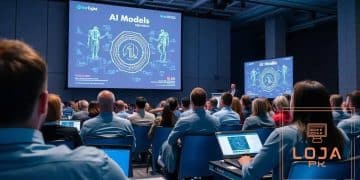AI-powered IDEs reshape software development landscape

AI-powered IDEs reshape the software development process by enhancing coding efficiency, fostering collaboration, and addressing key challenges while offering future trends that promise further improvements in development tools.
AI-powered IDEs are transforming the software development process in ways we might not have imagined. Ever wondered how these tools can amplify your coding experience and streamline workflows? Let’s dive in and explore their growing influence.
Understanding AI-powered IDEs
Understanding AI-powered IDEs is essential for any developer looking to enhance their coding experience. These integrated development environments leverage artificial intelligence to streamline various aspects of software development.
What are AI-powered IDEs?
AI-powered IDEs are tools designed to assist developers by automating repetitive tasks and offering intelligent code suggestions. This greatly reduces the time spent on mundane activities, allowing developers to focus on more complex problem-solving.
Key Features of AI-powered IDEs
They come with several unique features, including:
- Code Completion: These IDEs predict what the developer wants to write next, speeding up the coding process significantly.
- Error Detection: AI can instantly identify potential bugs and offer solutions, leading to cleaner code.
- Smart Refactoring: AI helps improve existing code without changing its functionality, making it easier to maintain.
- Real-time Collaboration: Developers can work together seamlessly, regardless of their physical location.
Transitioning from traditional IDEs to AI-powered IDEs can be a game-changer for developers. Many find that these tools can enhance their productivity and creativity. As you start using these intelligent IDEs, you’ll likely notice improvements in your coding efficiency and problem-solving capabilities.
Moreover, the interactive feedback provided by these IDEs allows for a more engaging learning process. This is particularly beneficial for novice programmers, as they receive immediate assistance to help them improve their skills.
In summary, understanding and utilizing AI-powered IDEs can significantly reshape your approach to software development. With their advanced capabilities and user-friendly interfaces, they are set to become indispensable tools in the coder’s toolkit. Experimenting with these technologies can lead to exciting developments in your projects.
How AI enhances coding efficiency

AI enhances coding efficiency in various ways, making it a crucial tool for developers today. By automating tedious tasks, AI allows programmers to focus on solving complex problems.
Automation of Repetitive Tasks
One of the most significant advantages of AI is its ability to automate repetitive coding tasks. For instance, it can handle basic formatting, syntax checking, and even code generation. This automation saves time and reduces errors, enabling developers to write more code in less time.
Smart Suggestions
AI-powered tools provide smart suggestions during coding, helping developers choose functions and methods efficiently. These suggestions are based on real-time analysis of the code being written. The more a developer uses the tool, the better its suggestions become. For example:
- Contextual Recommendations: AI analyzes the context of the code to offer relevant functions.
- Syntax Correction: It instantly detects and suggests corrections for syntax errors, minimizing debugging time.
- Code Snippets: Developers can easily insert predefined code snippets, speeding up the development process.
This assistance is especially beneficial for new developers learning coding practices. They can receive immediate feedback and guidance, which accelerates their learning curve. As developers continue to use AI tools, their coding skills often improve as well.
Moreover, AI tools can analyze entire codebases, identifying patterns and recommending improvements. This analysis can significantly enhance software quality, streamline maintenance, and reduce technical debt. By adopting AI in their workflow, developers create higher-quality applications more efficiently.
Incorporating AI into the development process not only boosts productivity but also fosters creativity. With tools handling monotonous tasks, developers can spend more time on innovative solutions and exploring new technologies in their projects.
Collaboration features of AI-enabled IDEs
Collaboration features of AI-enabled IDEs are transforming how developers work together on projects. These tools make it easier to share ideas and code in real-time, enhancing teamwork.
Real-Time Code Collaboration
Many AI-enabled IDEs offer real-time collaborative coding. This means multiple developers can work on the same code base simultaneously. Any changes made by one person are instantly updated for all team members, which helps avoid version conflicts.
Integrated Communication Tools
These IDEs often include integrated communication tools, allowing teams to chat or leave comments directly in the code. This fosters immediate feedback and discussion, enhancing the overall development process. Some key benefits include:
- Easier Coordination: Team members stay aligned and can address issues on the spot.
- Contextual Discussions: Conversations happen right where the code is, providing context for decisions.
- Documentation: Comments can serve as documentation, helping new team members understand the code faster.
The support for pair programming is another benefit. AI tools can suggest code while two developers work together, enhancing learning experiences. With one person coding and the other offering guidance, the process becomes more effective.
Moreover, some AI-enabled IDEs can track changes and contributions from different team members. It provides insights into who made which changes, facilitating accountability and review processes. This is particularly useful during code reviews when team leads assess the quality of contributions made by their team.
Overall, collaboration features in AI-enabled IDEs not only increase productivity but also enhance the quality of the final product. These tools are essential for developers who want to maintain smooth communication and ensure high standards in their projects.
Challenges and limitations of AI in development

While AI greatly enhances software development, it also comes with specific challenges and limitations. Developers must be aware of these issues to use AI effectively.
Understanding Data Limitations
AI models rely heavily on data to learn and make predictions. If the data used to train these models is biased or incomplete, the AI may produce inaccurate results. This can lead to serious consequences in real-world applications. For instance, biased data might result in poor user recommendations or flawed diagnostics in healthcare.
Complexity of Implementation
Integrating AI into existing development processes can be complex. Developers may face challenges such as:
- Technical Expertise: Many teams lack the necessary skills to work with AI technologies effectively.
- Cost: Implementing AI solutions can be expensive, especially for small businesses.
- Integration Issues: Merging AI tools with current software can lead to compatibility problems.
- Maintenance: AI systems require ongoing updates and maintenance to ensure they function correctly.
The risk of over-reliance on AI tools is another concern. While AI can improve efficiency, it is essential for developers to remain involved in critical decision-making processes. Over-dependence might result in a lack of human oversight, leading to potential errors.
Furthermore, AI cannot replicate human creativity and intuition. Certain tasks require a unique human touch that machines currently cannot provide. For example, developing innovative solutions often requires understanding deeper user needs and preferences that AI may not fully grasp.
Finally, ethical concerns are rising with the use of AI in development. Issues like privacy, security, and accountability are paramount. Developers must consider how AI interacts with user data and ensure that user rights are protected. Addressing these ethical concerns is vital for building trust in AI technologies.
Future trends in AI-powered development tools
Future trends in AI-powered development tools promise exciting advancements that will further change how developers work. As technology evolves, these tools are expected to become even more integrated into daily coding tasks.
Enhanced Machine Learning Algorithms
One major trend is the continuous improvement of machine learning algorithms. These enhancements will enable AI tools to understand context better and provide more accurate suggestions. Developers can expect tools that learn from user behavior, adapting to individual coding styles and preferences.
Increased Automation in Testing
Automation in testing is also on the rise. AI-powered tools will likely automate many aspects of software testing, from identifying bugs to running test cases. This process will save time and resources, allowing developers to focus on more complex tasks that require human judgment.
Other trends include:
- Integration with Cloud Services: Many AI tools will become seamlessly integrated with cloud platforms, allowing for better scalability and collaboration.
- Natural Language Processing: Developers will be able to write code and documentation using natural language, making the process more intuitive.
- Emphasis on Security: As AI tools grow, so will the focus on security features to protect against vulnerabilities in applications.
Another exciting prospect is the rise of AI-driven code reviews. These tools can offer suggestions and highlight potential errors in real time, enhancing code quality. They allow for faster feedback loops, meaning that developers can implement changes more quickly without waiting for extensive manual reviews.
Finally, the collaboration features of AI tools will likely evolve. Future tools may include more advanced functionalities, such as real-time collaboration across different time zones and environments, making teamwork more efficient. As developers in various locations connect and work together, the quality of software projects is expected to improve significantly.
FAQ – Frequently Asked Questions About AI-Powered Development Tools
How does AI improve coding efficiency?
AI enhances coding efficiency by automating repetitive tasks and providing smart suggestions, allowing developers to focus on complex problems.
What are the collaboration features of AI-enabled IDEs?
Collaboration features include real-time editing, integrated communication tools, and tracking changes to improve teamwork and coordination among developers.
What challenges should developers anticipate when using AI tools?
Developers may face challenges like data limitations, technical complexities, and security concerns when implementing AI in their workflow.
What future trends should we expect in AI-powered development tools?
Future trends include enhanced machine learning algorithms, increased automation in testing, and greater integration with cloud services for improved scalability.





